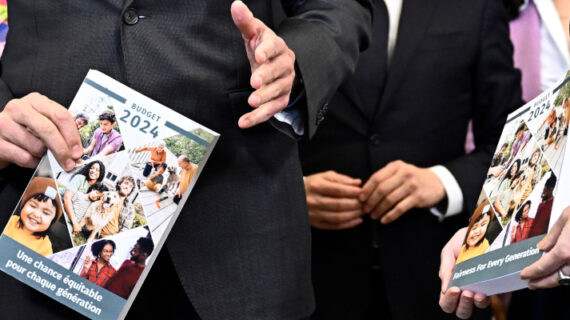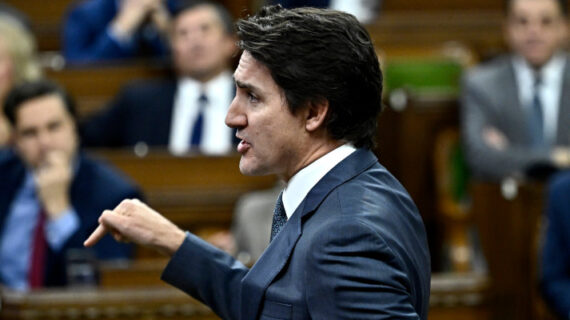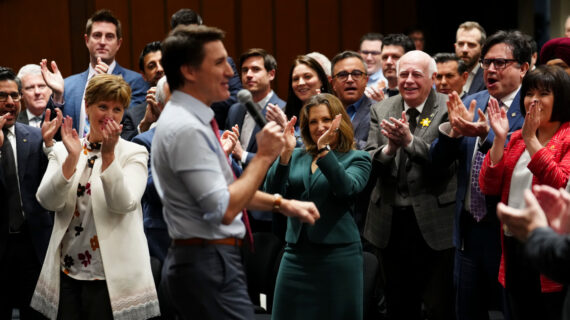In this Hub Dialogue, The Hub’s editor-at-large Sean Speer speaks to Hub contributor, and former Canadian ambassador to Israel, Vivian Bercovici, who lives in Tel Aviv has spent long stretches of the last week huddling in a stairwell as air raid sirens have wailed across the city. More than a week of fighting in the region has left more than 200 people dead and diplomatic efforts have stalled.
This conversation has been revised and edited for length and clarity.
MORE SIGNAL. LESS NOISE. THE HUB NEWSLETTER.
Sean Speer
Hi, Vivian. Let me start by asking you to reflect on what this current fit of terrorism and violence has meant for the lives of ordinary people in the region. Can you just tell us about what life has been like for you and your family in Tel Aviv in recent days and how it’s been affected by current events?
Vivian Bercovici
It’s interesting, when you ask the question, you refer to terrorism and violence and one of the things I know that people like me and commentators are struggling with is: what exactly is this? Is it a war yet? Can you call it that when you’re being hit with rockets? There’s a lot of violence separate from the Hamas rockets.
What’s it like? It’s really, really difficult. I live in central Tel Aviv. I’ve been through many wars and rocket attacks in the past. But never anything like this. Tel Aviv has never been barraged as it has been in the last week. Hundreds of rockets. And you just have to run to whatever you have. Some homes have a safe room right in the apartment. Older buildings like the one in which I live don’t have a bomb shelter. And so we all kind of huddle in the stairwells, which are reinforced and safe and intended to protect people during times of war. And you just sort of sit there, repeatedly in the middle of the night and you hear these incredibly loud explosions all around you and above you. They’re unceasing and it goes on for 15 minutes, a half hour or 45 minutes. And it just doesn’t stop.
Each one sounds like it’s right on your building, even though it might be a kilometre away. So what’s it like? It’s scary. I think everyone’s suffering from nervous exhaustion. Nobody’s really doing anything, you can’t really go anywhere, because you can’t be too far from a shelter. I’m in Tel Aviv so the people who live closer to Gaza, in cities like Ashkelon and Ashdod, and all of the smaller agricultural communities right by the Gaza Strip, they’re just getting hammered day and night. It just doesn’t stop.
I have a friend who lives on a kibbutz right there and he said 90 percent of the kibbutz just left. You can’t be there. You’re just literally living in a bomb shelter all the time. So it gets to you. Having said that, we have electricity, you know, and we’re living. It’s nothing like what the residents of the Gaza Strip are suffering, or Israelis living in towns and villages abutting the Strip. But I have to say, me, my daughter and her boyfriend, I do live in Tel Aviv, but just arrived somewhere in the north, in a very quiet place in the middle of the forest, because we all just needed a break. We just couldn’t take anymore.
Sean Speer
In your response, you alluded to the fact that this isn’t a single issue or a single episode and that the foreign media is sort of missing the fact that it’s actually a series of separate yet interrelated forces that have contributed to this recent burst of terrorism and violence. Do you mind just unpacking that for Hub readers? What are the factors that have led to the extraordinary circumstances of the past week or so?
Vivian Bercovici
I don’t think the foreign media, and I think we can pretty much lump all of them together, there are a few exceptions, I don’t think they missed much. I think what they’ve done is chosen to twist what’s gone on in the last few weeks to present it as a war, confrontation or escalation entirely attributable to Israel. As opposed to standing back and looking at what’s really going on on the ground, and how everything just sort of combusted at the same moment. And there are a bunch of things going on on the ground.
One is there’s this neighborhood in East Jerusalem called Sheikh Jarrah and it’s a Palestinian neighborhood largely. There is a particular property dispute involving a number of homes in Sheikh Jarrah that’s been going on for about 40 years. And coincidentally, the decision with respect to ownership of those homes, whether it will rest with the Palestinians or the Israelis, was scheduled to be decided last week by the Israeli Supreme Court. Again, something that’s been in litigation for decades. And so the whole Sheikh Jarrah thing became a bit of a flashpoint and a focus.
Some Palestinians were saying the occupiers are stealing our land, others kind of seeing it for what it actually is. It’s quite a pedestrian, if somewhat complex property dispute where the parties happened to be Israeli and Palestinian. But it’s not about some horrific colonialist land grab. But that’s how the press has chosen to portray it.
So there were some riots over Sheikh Jarrah and the court agreed to postpone the decision. Then you have the month of Ramadan, which unfortunately, very often becomes a month of rioting in Israel. And this year, it was a little worse. And to be perfectly candid, the Israeli police handled it very badly. They were concerned about riots. They knew there was talk about riots, they knew that young Palestinians had been building up stockpiles of rocks and Molotov cocktails in the Al-Aqsa Mosque, place of worship. And so they got a little heavy handed in terms of restricting access.
There’s a big square called Damascus Gate, which is one of the entrances to the Old City. Of course, it’s near Al-Aqsa and Muslims just like to congregate there and hang out during Ramadan in the evening and the police just blocked it off. Which was not the smartest thing to do because it angered people even more.
And so then, before we knew it, we did have full blown riots with quite heavy-handed policing, around Al-Aqsa Mosque and in East Jerusalem. And at the same time, you have Mahmoud Abbas, who’s president of the Palestinian Authority. And he had said a few months ago, we’re going to have elections. And the elections, of course, were supposed to fall right around now. And I guess he got some internal polling that showed that if there were elections now that Hamas would actually probably win the West Bank. So he said, you know, what, the Israelis are about to storm and take over and occupy Al-Aqsa Mosque. And that’s really terrible, so let’s cancel the elections and focus on that.
That lie is one that Abbas, the moderate, pulls out all the time. He does it constantly, whenever he needs to distract from his own internal or domestic problems he says, the Israelis are taking over the mosque. And it’s all not true. So that was kind of the final straw, and then it was last Monday when Hamas said, alright, that’s it, you know, you guys are occupying Al-Aqsa, somebody has to defend Islam and Jerusalem. So get all of your police out of Al-Aqsa and out of the area around Al-Aqsa by 6 p.m., or we’re going to attack Tel Aviv. And they did.
They started shortly after 6 p.m. on Monday. It was quite amazing. They don’t usually give us warning. And that’s when it all started. There was at that point, nothing going on between Hamas and Israel. The attacks on Israeli civilians have been ongoing. There have been 1000s of rockets now shot into Israel, directed at civilians intentionally and they shot the first shot. Now, what the foreign press is trying to do is say that’s why it’s all linked. Well, it’s actually not all linked. The fact that Hamas chooses to link a lie about Israel taking over the Al-Aqsa Mosque in the Temple Mount area to this conflict doesn’t make it true.
Sean Speer
Let me ask you a question closer to home in Canada. There have been protests and episodes of violence in Canadian cities in recent days, including evidence that Canadian Jews were targeted by pro-Palestinian protesters in some high-profile cases in Montreal and Toronto over the weekend. We’ve since had some politicians come out in reaction to those alleged incidents. As someone who’s lived in Canada and in Israel, and of course, has served as ambassador to Israel, can you just reflect on these events in Canada and what it means for Canada’s own politics and culture and perspectives on the Israel-Palestine question?
Vivian Bercovici
The Jewish Federations, which is sort of an umbrella organization in Toronto, for all Jewish organizations, posted on Twitter last night a notice to Jewish people, if you feel unsafe, call 911 and then contact us if you feel threatened. This is unbelievable. This is Toronto, this is my hometown. It was a very large rally in Nathan Phillips Square in support of the Palestinians. And there’s a small counter-demonstration by people supporting Israel. I’m sure many of whom, but not all of them, were Jewish. And they were attacked physically and there’s a lot more than that going on. I find it horrifying that it has taken my prime minister, Justin Trudeau, two days to come out with a statement that frankly said nothing.
Sean Speer
Let me just say on behalf of The Hub editorial team, and of course, our audience that we’re thinking of you and your family in these circumstances, and praying for your safety as well as the safety of others in the region. Thank you for thoughts and insights. I think our audience will benefit a great deal from your perspective. Be safe and thank you very much.




